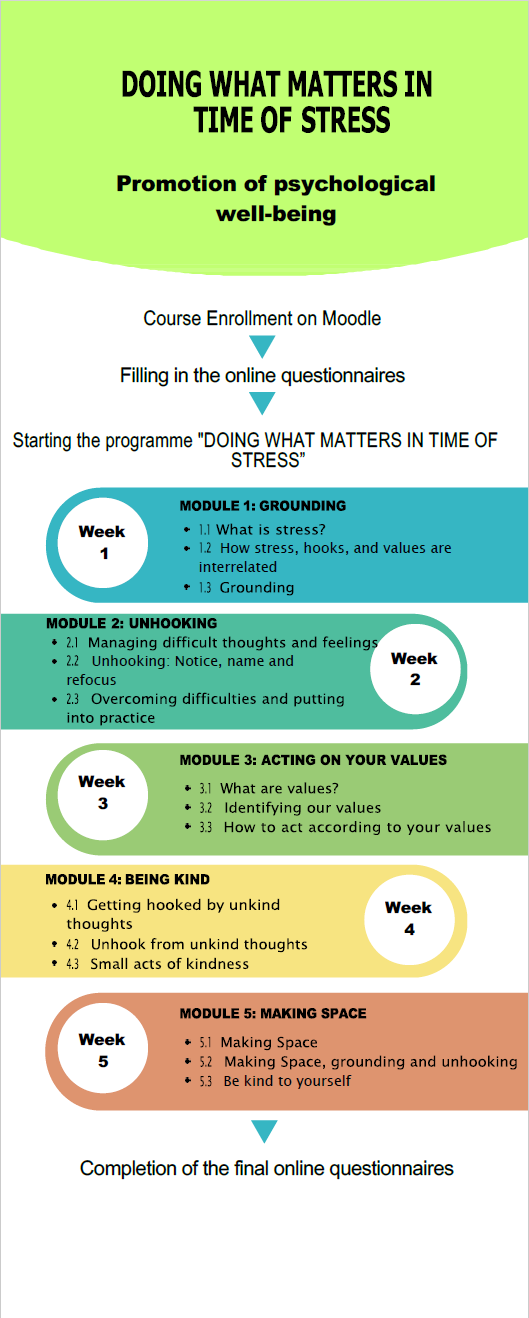Campus Project
Characterize and Address Mental health Problems in University StudentsThe project “CAMPUS: Characterising and addressing mental health problems in university students”, targeting the students at the University of Verona, is the result of the experience gained by the team of professionals of the World Health Organisation's (WHO) Collaborating Centre for Mental Health Research in the Department of Neuroscience, Biomedicine and Movement, and the collaboration with the Joint Committee for Equal Opportunity and the Orientation Service of the University of Verona. The aim of the project is to promote the psychological well-being of all students enrolled at the University of Verona through an intervention for psychological support and prevention developed by the WHO, called ‘Doing What Matters in Times of Stress’.
This intervention is part of the framework offered by Life Skill for Europe, which aims to promote skills in young generations that are useful both personally and professionally, as well as from the perspective of civic engagement, called Transversal Skills.
The TaLC Centre of the University of Verona promotes courses, including ‘Doing What Matters in Times of Stress’, delivered online and recognised with 1 CFU as a training activity in area F (or area D)’.
Video
Press conference on July 24, 2023. Read about it on Univrmagazine:
Why was this project created?
International literature shows a significant increase in psychological distress and mental disorders among university students, who are thus identified as a vulnerable population to the negative effects of stress, with a potentially high cost in terms of health, quality of life and career choices.
The transition from late adolescence to early adulthood, which corresponds to the university period, represents, on the one hand, a time that offers important opportunities for personal growth but, on the other hand, it is a developmental phase that also seems to coincide with the period of greatest risk for the onset of mental health disorders, including anxiety, depression, substance abuse, self-harm and suicidal behaviour, with a potential impact on many areas of life, including motivation, decision-making processes and general well-being.
Therefore, promoting psychological well-being becomes particularly significant at this stage of life. This is also crucial within the university context, especially through the implementation of interventions that can teach students how to manage stress to prevent or reduce subsequent mental health issues.
What are the objectives?
The objective of this project is to offer a support and preventive intervention to all students at the University of Verona through a psycho-social programme developed by the WHO, called ‘Doing What Matters in Times of Stress’. In addition, this project aims to evaluate, through the use of some brief questionnaires to be filled in before and after the intervention, the impact and effectiveness of this intervention in promoting psychological well-being, reducing psychological symptoms and distress, with the aim of preventing mental diseases.
What is “Doing What Matters in Times of Stress”?
The intervention “Doing What Matters in Times of Stress” is a psychological program developed by WHO for stress management.
It comprises five modules, which include various strategies based on Acceptance and Commitment Therapy (ACT):
- Grounding
- Unhooking
- Acting on your values
- Being kind
- Making space
The content of each module includes texts, images and audio materials based on mindfulness. The intervention is designed as a self-guided tool, which can be used in daily life for a few minutes each day to reduce stress levels.
What is the procedure?
Students who decide to participate in the project can access the university e-learning platform “Moodle” with their credentials and selecting the intervention “Doing What Matters in Times of Stress” from the education provided.
After a brief presentation of the program and signing the informed consent form, participants will be asked to complete some standardized questionnaires via a specific link sent by email, which will give them direct access to LimeSurvey. The questionnaires relate to brief sociodemographic data and psychological well-being, including the presence of any symptoms of depression and stress and general functioning; completing them will be brief, taking a maximum of 10 minutes. All data will be used anonymously. A password will be provided to access the “Doing What Matters in Times of Stress” intervention on the Moodle platform. The intervention has a duration of five weeks, and each module can be completed in the way preferred by each student, all at once or in multiple sessions, for a total of about 15 minutes per module. At the end of the five modules, students will receive a new email the online follow up questionnaires on psychological well-being and stress again, to evaluate the impact and appreciation of the intervention.
To access the program (active in the next academic year 2024/2025)
- Go to the “Transversal Skills” webpage: Course “Doing What Matters in Times of Stress” https://talc.univr.it/it/competenze-trasversali (if you want the recognition of the training credit -1Cfu- and Open Badge)
- Directly with Moodle Link and QR code with direct access to the intervention “Doing What Matters in Times of Stress”

Project managers
- Prof. Michela Nosè, WHO Collaborating Centre for Research and Training in Mental Health, University of Verona
- Prof. Corrado Barbui, WHO Collaborating Centre for Research and Training in Mental Health, Department of Neuroscience, Biomedicine, and Movement, University of Verona
- Prof. Massimiliano Badino, Department of Human Sciences, University of Verona
Participate in the project
-
Olga Forlani and Davide Sartori (Innovative Technologies for Teaching Group)
-
Chiara Antonioli and Marco Archivetti (Visual Communication)
-
Paolo Rucci (Information Systems Development)
For further information or any clarifications:
- Giulia Turrini: giulia.turrini@univr.it
- Giulia Muriago: giulia.muriago@univr.it



